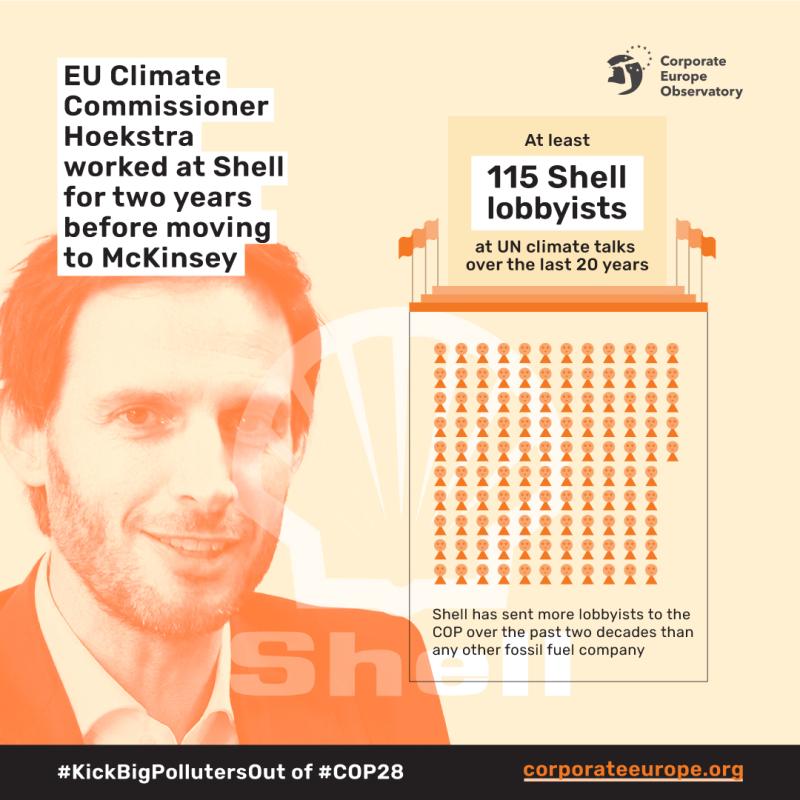Stay always informed
Interested in our articles? Get the latest information and analysis straight to your email. Sign up for our newsletter.

Brussels, 23 Nov: New research by Corporate Europe Observatory (CEO), asks further questions of the independence of new EU Climate Commissioner Wopke Hoekstra and his ability to represent the public interest at upcoming UN climate talks in UAE, and shows why big polluters think Hoekstra is the perfect pick to lead the bloc at COP28.
Hoekstra has never attended COP and has a proven pro-fossil fuels track record [1]. However, McKinsey and Company management consultancy, where Hoekstra spent 11 years (including five as a partner), has been at COP more than 27 times over the past 20 years according to the research, brought by fossil fuel trade associations, NGOs and governments. This figure appears to be the tip of the iceberg, as the research exposes McKinsey delegates who were at COP27 promoting oil and gas but did not appear in official participant lists.[2]
McKinsey’s known clients are also regular attendees at the UN climate talks. Just 10 of McKinsey's fossil fuel clients, including Shell, BP, ExxonMobil [3] sent over 400 lobbyists since 2003. Shell itself - who Hoekstra worked for between 2004 and 2006 - has sent at least 115 delegates, more than any other fossil fuel company.
“Hoekstra has never attended COP before, but McKinsey and many of their most polluting clients are comparative veterans. McKinsey’s even advising the COP28 Presidency. So who is Hoekstra turning to for advice? And after 11 years at the company, including five as a partner, whose interests can we expect him to represent in Dubai - ours or his ex-employer’s?” said Pascoe Sabido, researcher and campaigner at Corporate Europe Observatory.
The research also reveals that Eric Wiebes, a fellow right-wing Minister between 2017-2021 who unlike Hoekstra has attended multiple COPs, is now back at McKinsey as a partner, promoting “zero emissions” fossil fuel technologies [4]. Wiebes had agreed to “not participate in any Dutch or European public sector work or interact with institutions or companies he dealt with during his time in government” until January 2023, before Hoesktra was appointed Climate Commissioner.
When asked whether he has been in touch with his fellow ex-Minister about COP28, Wiebes commented that they had maintained “some level of irregular, informal contact”, and that while not assisting him on COP he has “no intention to avoid Hoekstra”. According to Wiebes, doing so would not “have posed a conflict of interest” but rather helped “prepare [Hoekstra] for the COP with a good understanding of the most emitting processes.”
More than 100,000 people had already called for Hoekstra to not be appointed EU Climate Commissioner given his clear pro-fossil fuel bias. The Fossil Free Politics coalition, which CEO is part of, now calls on Hoekstra to disclose his clients while at McKinsey, as promised to the European Parliament. CEO also calls for him to disclose all connections he may still have there, for example with Eric Wiebes, as well as supporting the European Parliament COP28 resolution which calls for a conflict of interest policy at the UN talks, like the one introduced by the World Health Organisation [5].
“Given his opaque past and questionable associations, Hoekstra must not only reveal his client list and connections to McKinsey, but also ensure the EU backs a firewall to protect the UN talks from fossil fuel interference, like the Parliament’s COP28 resolution demands. Otherwise he should expect a frosty reception on his return from Dubai, and not just because of the Brussels weather.” added Sabido.
Contact details:
For more information contact:
Pascoe Sabido, Corporate Europe Observatory researcher and campaigner
pascoe@corporateeurope.org, Signal: +447969665189
Gail Rego, Corporate Europe Observatory communications and press consultant
gail@corporateeurope.org, Signal: +32487202211
Notes to editor